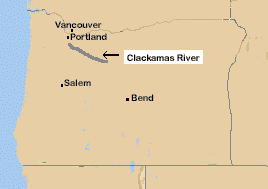Intel CT (Yamhill) = Clackamas Technology. Facts and comments on the threshold of announcement
Without a doubt, one of the key intrigues at IDF Spring 2004 will be the announcement of the new Intel CT technology implying the support of some 64-bit instructions by 32-bit desktop and server similar to AMD Opteron/Athlon 64. Judging by the hype around this theme, our readers are just dying to see something reliable regarding this CT technology. Intel is still keeping the total silence, while various analysts gather drops of leaked information and make assumptions.
Materials published on Sunday at CNet and a large publication by Reuters shed some light on some more information about this project. For example, CNet claims that CT stands for Clackamas Technology.
 I was always wondering how companies succeed in finding sonorous names to their developments. From search engines I found out that Clackamas is a county in North Oregon, near the Washington state border (don´t confuse Vancouver, WA, with Vancouver in Canada). But I guess they meant the Clackamas river running there as well. Seems like a nice place for fishing ;-)
I was always wondering how companies succeed in finding sonorous names to their developments. From search engines I found out that Clackamas is a county in North Oregon, near the Washington state border (don´t confuse Vancouver, WA, with Vancouver in Canada). But I guess they meant the Clackamas river running there as well. Seems like a nice place for fishing ;-)


As there´s no precise information about Clackamas, analysts continue to discuss the possible compatibility of Intel CT and AMD64 and the consequences. In particular, judging by the patent battles between Intel and AMD of 1987-1997, both companies were granted free access to each other´s patented developments and they also signed a cross-licensing agreement. At that AMD agreed not to make obvious clones of Intel´s processors (the result was K6, K6 II, K6III, Athlon, Duron, Athlon 64, and Opteron), and promised to pay Intel royalty for each chip with x86 architecture (plus for such technologies, as SSE/SSE2). Until now such payments were unidirectional only. It´s interesting that if Intel tries to make processors compatible with AMD Opteron/Athlon 64 and operating with 32/64-bit software, it won´t have to pay anything for using AMD developments, according to the court decision of 1995. Moreover, Intel has a right to release an AMD64-compatible instruction set and noone can stop it.
So, Intel willing or not willing to accept the AMD64 64-bit instruction set as a base for its 32/64-bit desktop and server chips is totally under control of company´s executives and is not related to any patent problems. Soon we´ll know where Intel turns, as tomorrow IDF Spring 2004 officially starts. We hope we´ll be the first to offer you this critical news.
Write a comment below. No registration needed!
|
|


